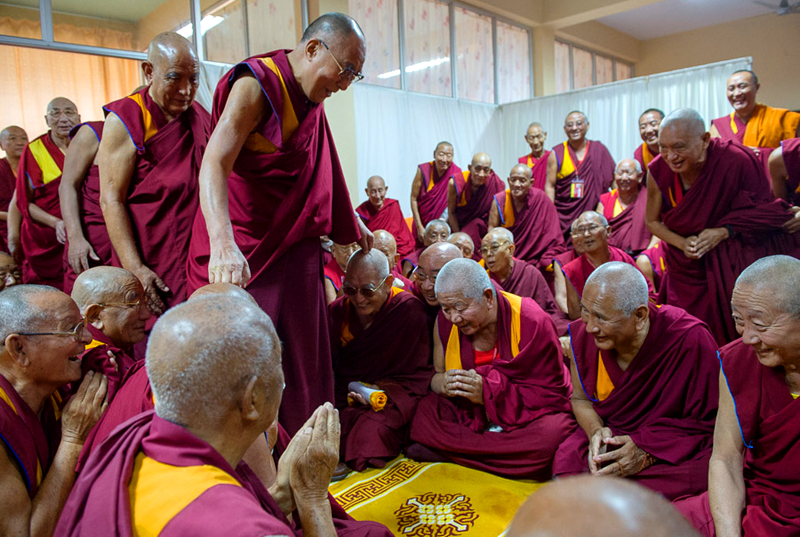 Bylakuppe, Karnataka — Tibetans are "following a non-violent path; we are united and will not give in," The spiritual leader of Tibet, His Holiness the Dalai Lama said while speaking to a group of senior Tibetan monks, at Sera Monastery in Bylakuppe, Karnataka, South India, on December 16.
Bylakuppe, Karnataka — Tibetans are "following a non-violent path; we are united and will not give in," The spiritual leader of Tibet, His Holiness the Dalai Lama said while speaking to a group of senior Tibetan monks, at Sera Monastery in Bylakuppe, Karnataka, South India, on December 16.
The spiritual leader of Tibet met a group of 72 senior Sera monks who were among those who originally escaped from Tibet in 1959, after a brutal suppression of the Tibetan people in Tibetan capital Lhasa and after the Chinese invasion of Tibet.
After greeting and teasing several of them individually, His Holiness the Dalai Lama addressed the group of senior Buddhist monks.
"When we first came to Missamari in Assam we didn't know what to do. We believed the truth of our cause would eventually prevail. But in Missamari it was hot remote and the food was poor. Many of you monks fell ill," His Holiness told them.
"We thought of shifting to another place, but the Abbots felt that if they were dispersed many of the monks would disrobe, so it was better to stay together where they were. Eventually we were able to realize a plan to establish settlements elsewhere and you were able to come together to South India.
His Holiness the Dalai Lama also expressed his appreciation for their hard work for Tibet's unique national, cultural and religious identity, which is seriously threatened and manipulated by the Chinese.
"You are the monks who worked hard to preserve our tradition in those hard times, you had faith in me, and I thank you," said the spiritual leader while praising them for being faithful to him and for their good work.
His Holiness spoke about the Chinese Communist Party's oppressive treatment of Tibetan Buddhist culture. "As the Chinese have found they can't uproot our religious culture, they have been forced to interpret our dedication to it as an expression of an urge for separatism. However, we are following a non-violent path; we are united and will not give in."
"In the past, monks used to come to our monasteries from Mongolia and China. Now we have people coming to join us from places that have not traditionally been Buddhist, scientists among them," he said.
"We've seen ups and downs in Tibetan history, but we still remain together because of the dedication of our great religious kings in the past," His Holiness told the senior Tibetan Buddhist monks.
"Nowadays people offer Long Life Offerings, but the time will come when we have to go. It's the same for you, and when that time comes what you've learned and practised of the Buddha's teachings will be important," he further said.
"I'm giving each of you a statue of the Buddha. Keep it in your room and recite Nagarjuna's verse of salutation to the Buddha as I do."
In the aftermath of the invasion, His Holiness the 14th Dalai Lama and more than 80,000 Tibetans fled into exile in nearby India. Since 1950s, the Chinese have killed a quarter of the population—about 1.2 million people out of 6 million—and have destroyed almost all of the six thousand monasteries that once existed.


![Tibet has a rich history as a sovereign nation until the 1950s when it was invaded by China. [Photo: File]](/images/stories/Pics-2024/March/Tibet-Nation-1940s.jpg#joomlaImage://local-images/stories/Pics-2024/March/Tibet-Nation-1940s.jpg?width=1489&height=878)















